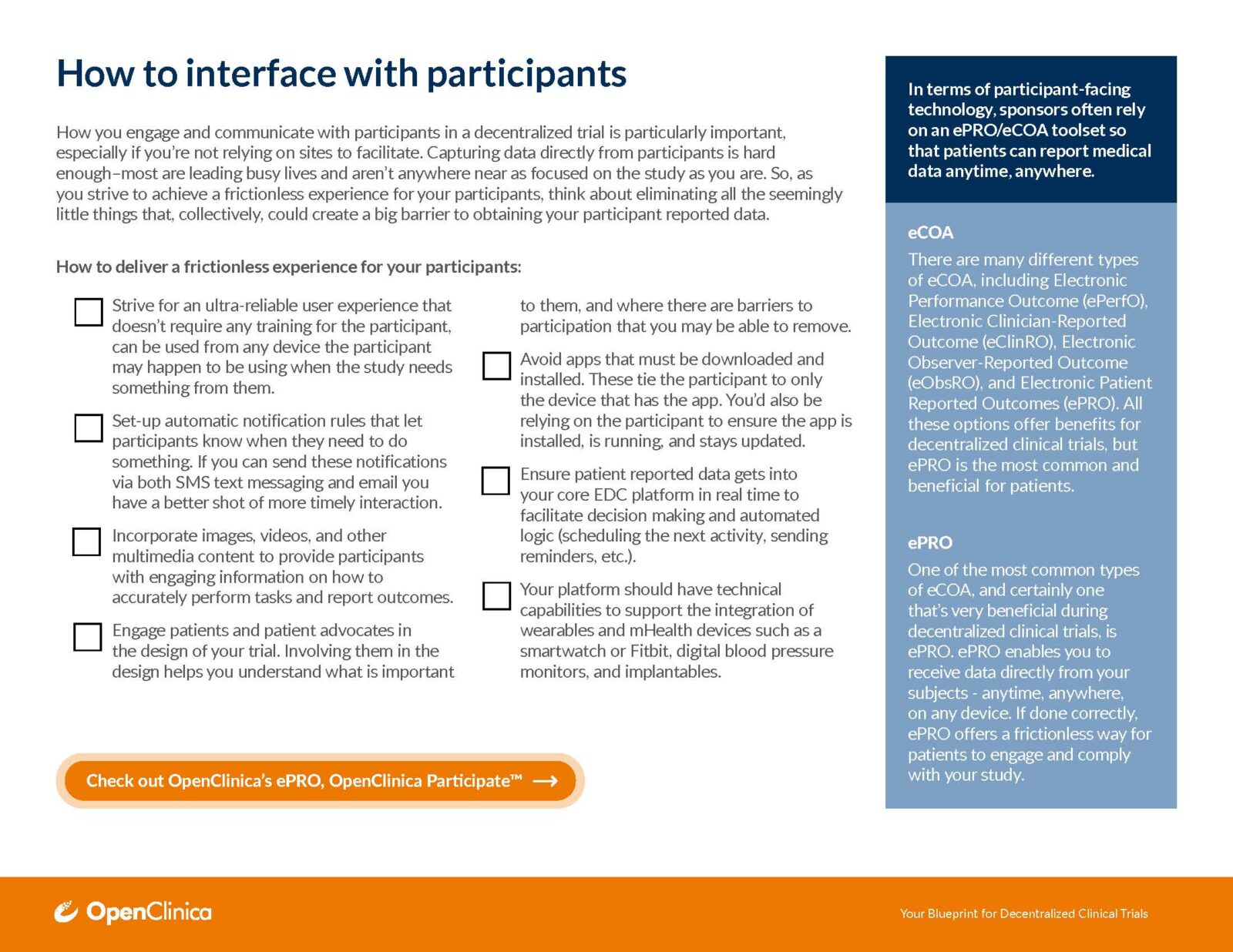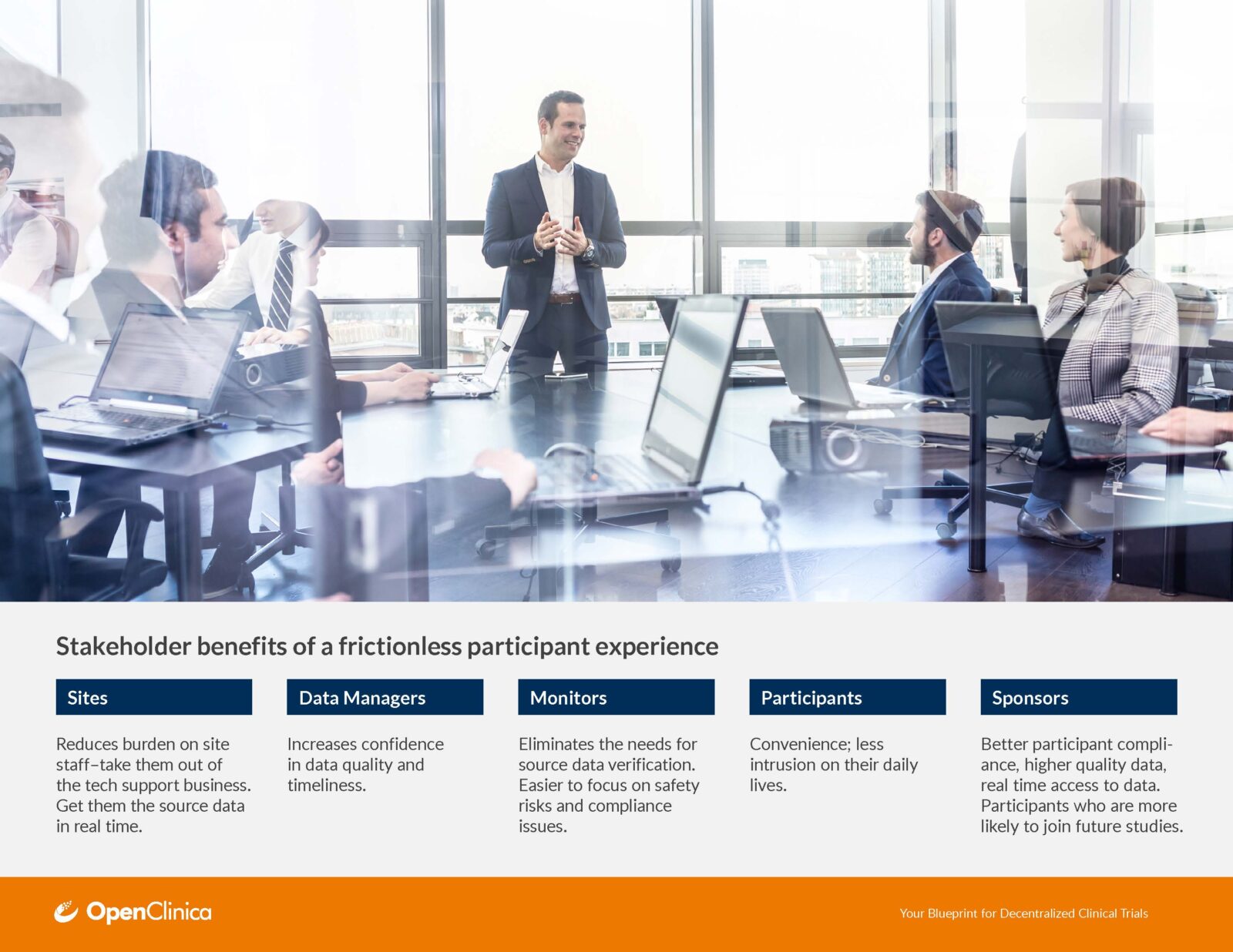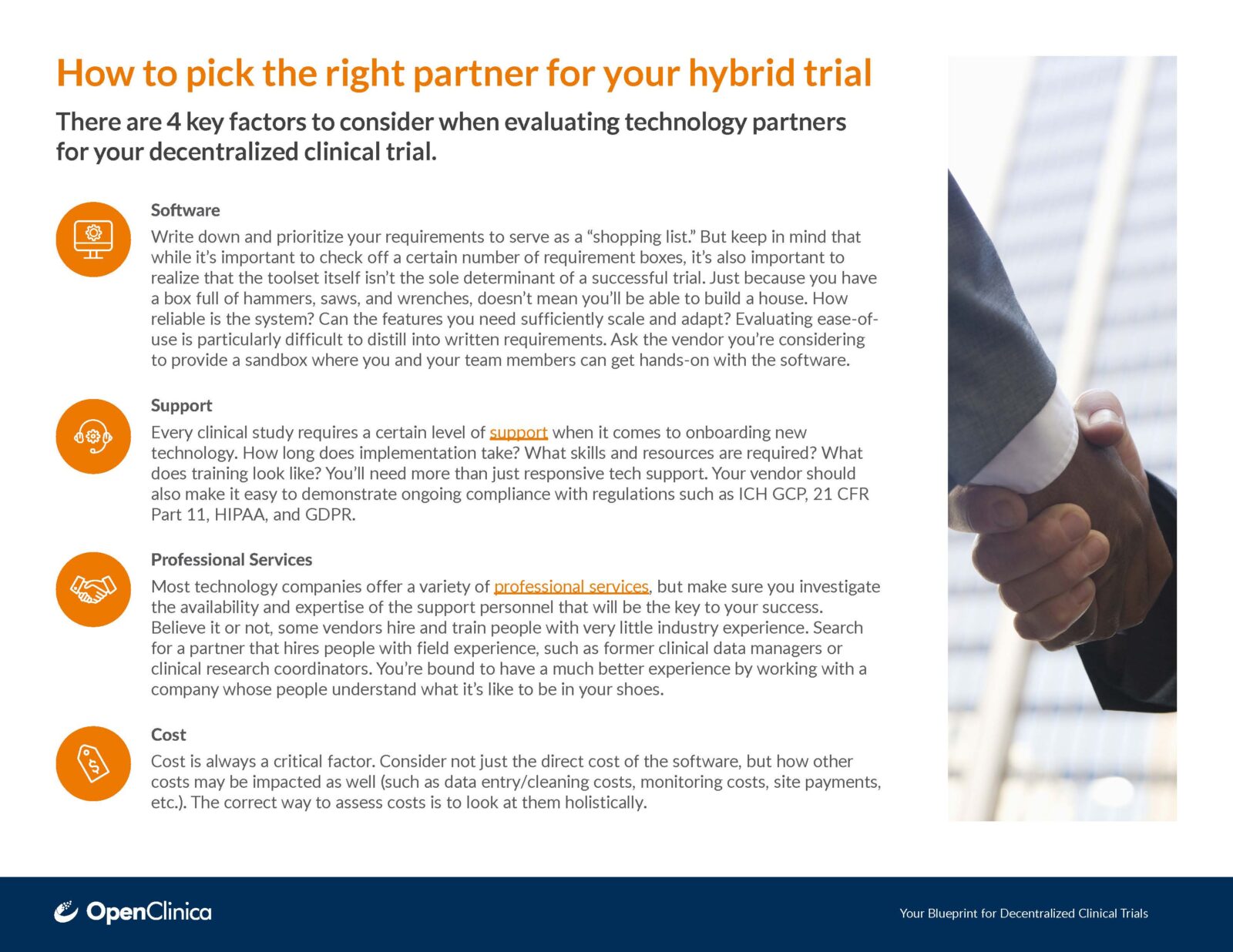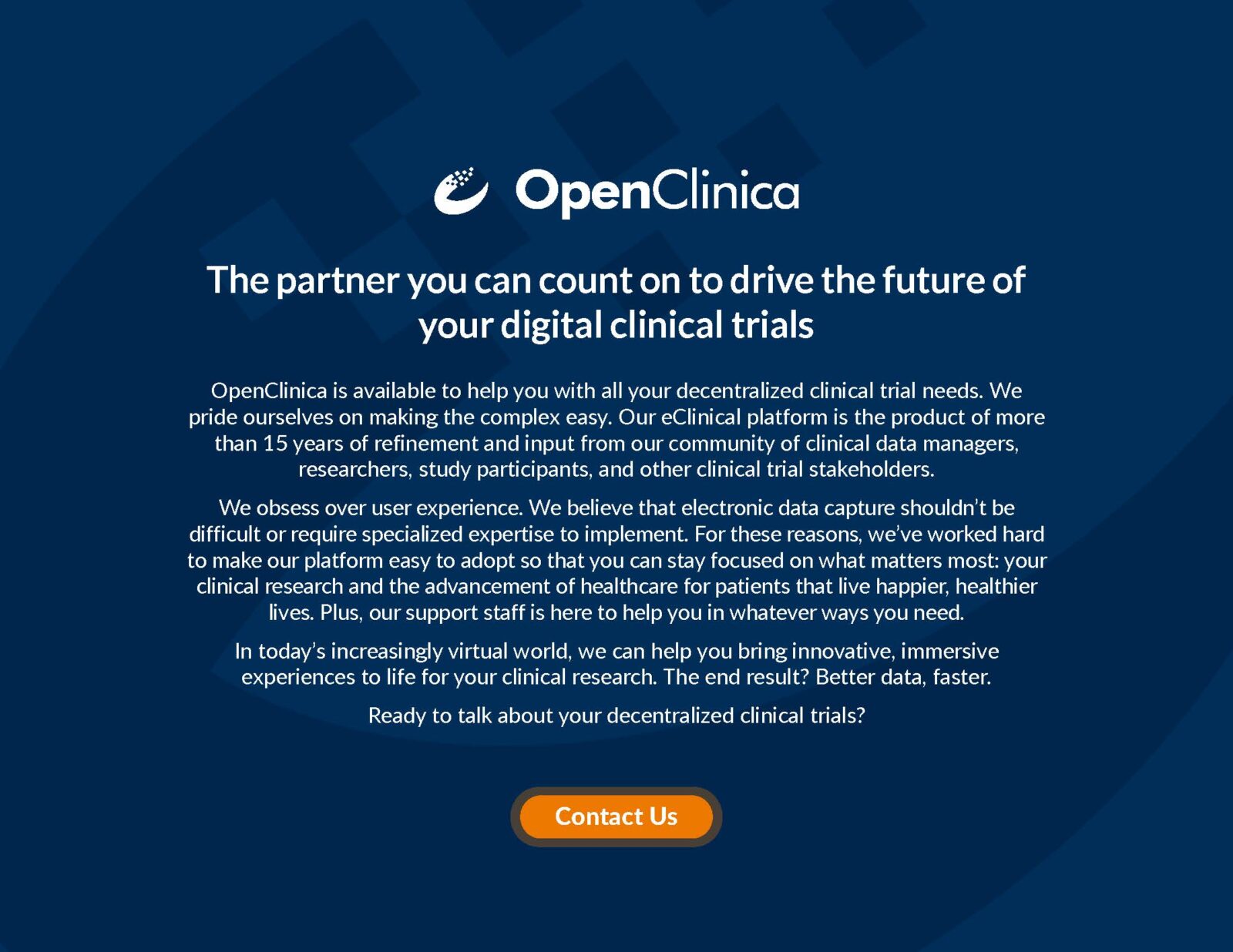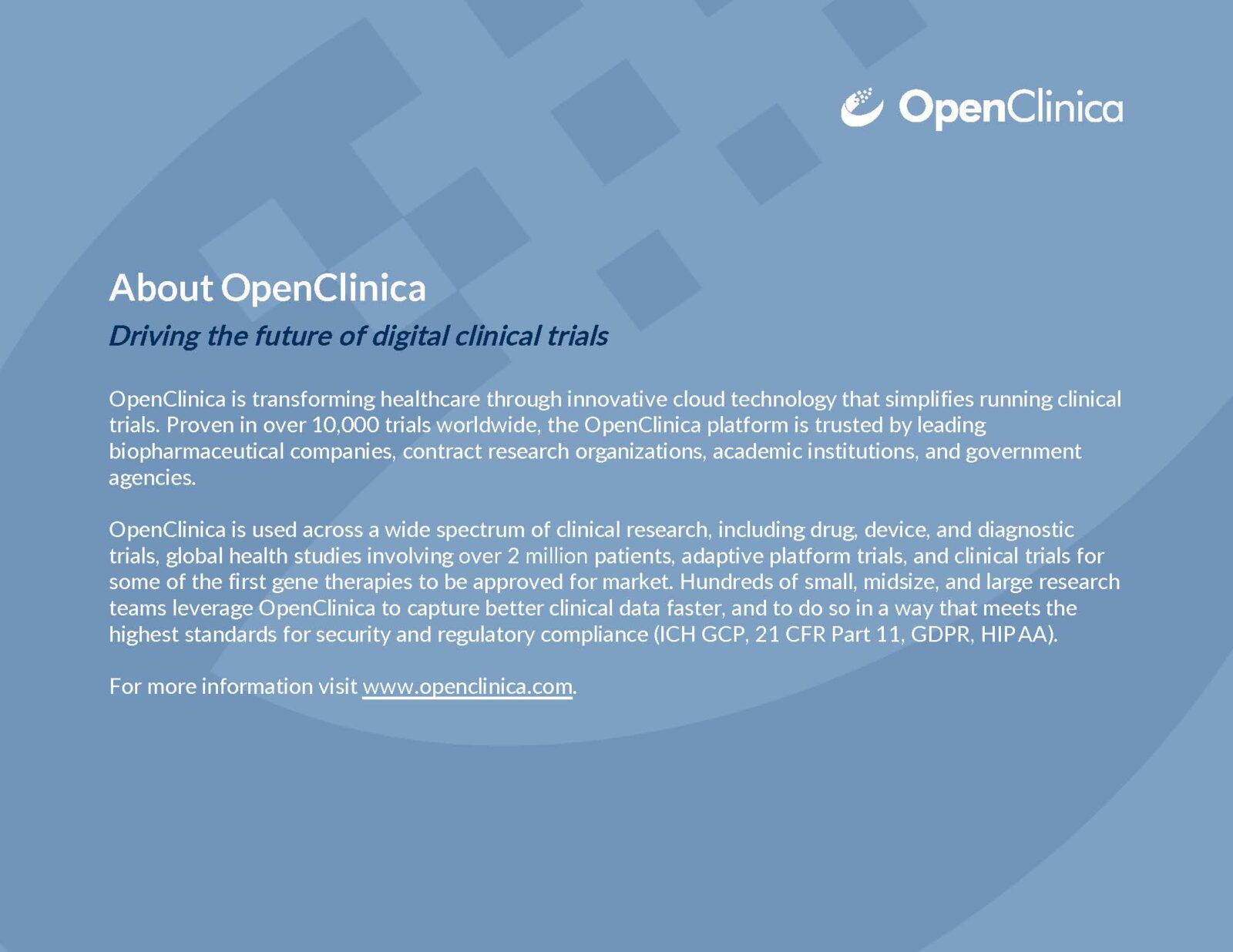A checklist for ensuring your decentralized clinical trial engages participants for optimal clinical trial retention
The following checklist showcases how adopting Electronic Patient Reported Outcomes (ePRO) technologies and processes can accelerate your move to decentralization, leading to increased participant engagement, streamlined workflows that make clinical data management easier, and reduced burden on clinical researchers.
Access our Blueprint for Decentralized Clinical Trials so that you can overcome these challenges.
Click on each image to zoom in.
Transcript
Page 1
How to interface with participants
How you engage and communicate with participants in a decentralized trial is particularly important, especially if you’re not relying on sites to facilitate. Capturing data directly from participants is hard enough–most are leading busy lives and aren’t anywhere near as focused on the study as you are. So, as you strive to achieve a frictionless experience for your participants, think about eliminating all the seemingly little things that, collectively, could create a big barrier to obtaining your participant-reported data.
Here’s a checklist for how to deliver a frictionless experience for your participants:
- Strive for an ultra-reliable user experience that doesn’t require any training for the participant and can be used from any device the participant may happen to be using when the study needs something from them.
- Set up automatic notification rules that let participants know when they need to do something. If you can send these notifications via both SMS text messaging and email you have a better shot of more timely interaction.
- Incorporate images, videos, and other multimedia content to provide participants with engaging information on how to accurately perform tasks and report outcomes.
- Engage patients and patient advocates in the design of your trial. Involving them in the design helps you understand what is important to them, and where there are barriers to participation that you may be able to remove.
- Avoid apps that must be downloaded and installed. These tie the participant to only the device that has the app. You’d also be relying on the participant to ensure the app is installed, is running, and stays updated.
- Ensure patient reported data gets into your core EDC platform in real time to facilitate decision making and automated logic (scheduling the next activity, sending reminders, etc.).
- Your platform should have technical capabilities to support the integration of EHR data, wearables, and mHealth devices such as a smartwatch or Fitbit, digital blood pressure monitors, and implantables.
In terms of participant-facing technology, sponsors often rely on an ePRO/eCOA toolset so that patients can report medical data anytime, anywhere.
eCOA: There are many different types of eCOA, including Electronic Performance Outcome (ePerfO), Electronic Clinician-Reported Outcome (eClinRO), Electronic Observer-Reported Outcome (eObsRO), and Electronic Patient Reported Outcomes (ePRO). All these options offer benefits for decentralized clinical trials, but ePRO is the most common and beneficial for patients.
ePRO: One of the most common types of eCOA, and certainly one that’s very beneficial during decentralized clinical trials, is ePRO. ePRO enables you to receive data directly from your subjects – anytime, anywhere, on any device. If done correctly, ePRO offers a frictionless way for patients to engage and comply with your study.
Check out OpenClinica’s ePRO, OpenClinica Participate ->
Page 2
Stakeholder benefits of a frictionless participant experience:
- Sites: Reduces burden on site staff–take them out of the tech support business. Get them the source data in real time.
- Clinical Data Managers: Increases confidence in data quality and timeliness.
- Clinical Trial Monitors: Eliminates the needs for source data verification. Easier to focus on safety risks and compliance issues.
- Participants: Convenience; less intrusion on their daily lives.
- Sponsors: Better participant compliance, higher quality data, real time access to data. Participants who are more likely to join future studies.
Page 3
How to pick the right partner for your hybrid trial
There are 4 key factors to consider when evaluating technology partners for your decentralized clinical trial.
- Software: Write down and prioritize your requirements to serve as a “shopping list.” But keep in mind that while it’s important to check off a certain number of requirement boxes, it’s also important to realize that the toolset itself isn’t the sole determinant of a successful trial. Just because you have a box full of hammers, saws, and wrenches, doesn’t mean you’ll be able to build a house. How reliable is the system? Can the features you need sufficiently scale and adapt? Evaluating ease-of-use is particularly difficult to distill into written requirements. Ask the vendor you’re considering to provide a sandbox where you and your team members can get hands-on with the software.
- Support: Every clinical study requires a certain level of support when it comes to onboarding new technology. How long does implementation take? What skills and resources are required? What does training look like? You’ll need more than just responsive tech support. Your vendor should also make it easy to demonstrate ongoing compliance with regulations such as ICH GCP, 21 CFR Part 11, HIPAA, and GDPR.
- Professional Services: Most technology companies offer a variety of professional services, but make sure you investigate the availability and expertise of the support personnel that will be the key to your success. Believe it or not, some vendors hire and train people with very little industry experience. Search for a partner that hires people with field experience, such as former clinical data managers or clinical research coordinators. You’re bound to have a much better experience by working with a company whose people understand what it’s like to be in your shoes.
- Cost: Cost is always a critical factor. Consider not just the direct cost of the software, but how other costs may be impacted as well (such as data entry/cleaning costs, monitoring costs, site payments, etc.). The correct way to assess costs is to look at them holistically.
Page 4
OpenClinica: The partner you can count on to drive the future of your digital clinical trials
OpenClinica is available to help you with all your decentralized clinical trial needs. We pride ourselves on making the complex easy. Our eClinical platform is the product of more than 15 years of refinement and input from our community of clinical data managers, researchers, study participants, and other clinical trial stakeholders.
We obsess over user experience. We believe that electronic data capture shouldn’t be difficult or require specialized expertise to implement. For these reasons, we’ve worked hard to make our platform easy to adopt so that you can stay focused on what matters most: your clinical research and the advancement of healthcare for patients that live happier, healthier lives. Plus, our support staff is here to help you in whatever ways you need.
In today’s increasingly virtual world, we can help you bring innovative, immersive experiences to life for your clinical research. The end result? Better data, faster.
Ready to talk about your decentralized clinical trials? Contact us >>
Page 5
Driving the future of digital clinical trials
OpenClinica is transforming healthcare through innovative cloud technology that simplifies running clinical trials. Proven in over 10,000 trials worldwide, the OpenClinica platform is trusted by leading biopharmaceutical companies, contract research organizations, academic institutions, and government agencies.
OpenClinica is used across a wide spectrum of clinical research, including drug, device, and diagnostic trials, global health studies involving over 2 million patients, adaptive platform trials, and clinical trials for some of the first gene therapies to be approved for market. Hundreds of small, midsize, and large research teams leverage OpenClinica to capture better clinical data faster, and to do so in a way that meets the highest standards for security and regulatory compliance (ICH GCP, 21 CFR Part 11, GDPR, HIPAA).

